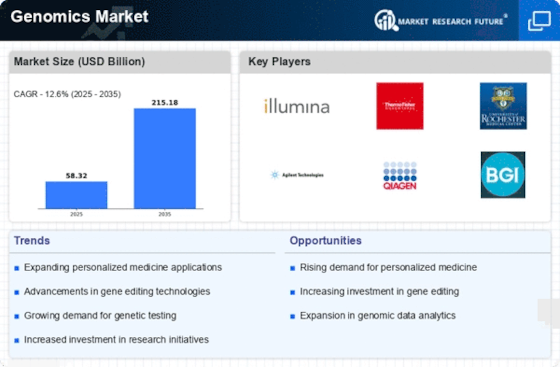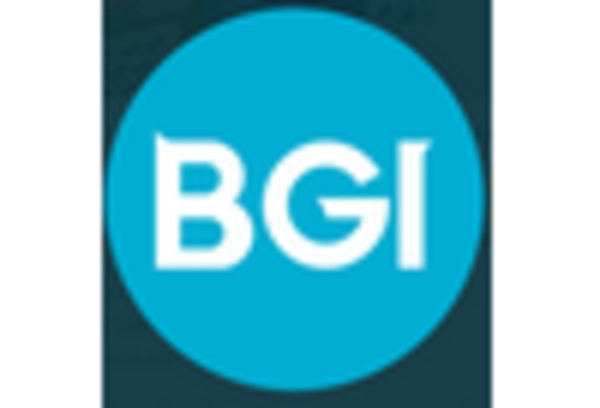Drug Discovery
Clinical Diagnostics
Personalized Medicine
Genetic Testing
Sequencing
Microarray
PCR
CRISPR
Hospitals
Diagnostic Laboratories
Research Institutes
Pharmaceutical Companies
North America
Europe
South America
Asia Pacific
Middle East and Africa
North America Outlook (USD Billion, 2019-2035)
North America Genomics Market by Application Type
Drug Discovery
Clinical Diagnostics
Personalized Medicine
Genetic Testing
North America Genomics Market by Technology Type
Sequencing
Microarray
PCR
CRISPR
North America Genomics Market by End Use Type
Hospitals
Diagnostic Laboratories
Research Institutes
Pharmaceutical Companies
North America Genomics Market by Regional Type
US
Canada
US Outlook (USD Billion, 2019-2035)
US Genomics Market by Application Type
Drug Discovery
Clinical Diagnostics
Personalized Medicine
Genetic Testing
US Genomics Market by Technology Type
Sequencing
Microarray
PCR
CRISPR
US Genomics Market by End Use Type
Hospitals
Diagnostic Laboratories
Research Institutes
Pharmaceutical Companies
CANADA Outlook (USD Billion, 2019-2035)
CANADA Genomics Market by Application Type
Drug Discovery
Clinical Diagnostics
Personalized Medicine
Genetic Testing
CANADA Genomics Market by Technology Type
Sequencing
Microarray
PCR
CRISPR
CANADA Genomics Market by End Use Type
Hospitals
Diagnostic Laboratories
Research Institutes
Pharmaceutical Companies
Europe Outlook (USD Billion, 2019-2035)
Europe Genomics Market by Application Type
Drug Discovery
Clinical Diagnostics
Personalized Medicine
Genetic Testing
Europe Genomics Market by Technology Type
Sequencing
Microarray
PCR
CRISPR
Europe Genomics Market by End Use Type
Hospitals
Diagnostic Laboratories
Research Institutes
Pharmaceutical Companies
Europe Genomics Market by Regional Type
Germany
UK
France
Russia
Italy
Spain
Rest of Europe
GERMANY Outlook (USD Billion, 2019-2035)
GERMANY Genomics Market by Application Type
Drug Discovery
Clinical Diagnostics
Personalized Medicine
Genetic Testing
GERMANY Genomics Market by Technology Type
Sequencing
Microarray
PCR
CRISPR
GERMANY Genomics Market by End Use Type
Hospitals
Diagnostic Laboratories
Research Institutes
Pharmaceutical Companies
UK Outlook (USD Billion, 2019-2035)
UK Genomics Market by Application Type
Drug Discovery
Clinical Diagnostics
Personalized Medicine
Genetic Testing
UK Genomics Market by Technology Type
Sequencing
Microarray
PCR
CRISPR
UK Genomics Market by End Use Type
Hospitals
Diagnostic Laboratories
Research Institutes
Pharmaceutical Companies
FRANCE Outlook (USD Billion, 2019-2035)
FRANCE Genomics Market by Application Type
Drug Discovery
Clinical Diagnostics
Personalized Medicine
Genetic Testing
FRANCE Genomics Market by Technology Type
Sequencing
Microarray
PCR
CRISPR
FRANCE Genomics Market by End Use Type
Hospitals
Diagnostic Laboratories
Research Institutes
Pharmaceutical Companies
RUSSIA Outlook (USD Billion, 2019-2035)
RUSSIA Genomics Market by Application Type
Drug Discovery
Clinical Diagnostics
Personalized Medicine
Genetic Testing
RUSSIA Genomics Market by Technology Type
Sequencing
Microarray
PCR
CRISPR
RUSSIA Genomics Market by End Use Type
Hospitals
Diagnostic Laboratories
Research Institutes
Pharmaceutical Companies
ITALY Outlook (USD Billion, 2019-2035)
ITALY Genomics Market by Application Type
Drug Discovery
Clinical Diagnostics
Personalized Medicine
Genetic Testing
ITALY Genomics Market by Technology Type
Sequencing
Microarray
PCR
CRISPR
ITALY Genomics Market by End Use Type
Hospitals
Diagnostic Laboratories
Research Institutes
Pharmaceutical Companies
SPAIN Outlook (USD Billion, 2019-2035)
SPAIN Genomics Market by Application Type
Drug Discovery
Clinical Diagnostics
Personalized Medicine
Genetic Testing
SPAIN Genomics Market by Technology Type
Sequencing
Microarray
PCR
CRISPR
SPAIN Genomics Market by End Use Type
Hospitals
Diagnostic Laboratories
Research Institutes
Pharmaceutical Companies
REST OF EUROPE Outlook (USD Billion, 2019-2035)
REST OF EUROPE Genomics Market by Application Type
Drug Discovery
Clinical Diagnostics
Personalized Medicine
Genetic Testing
REST OF EUROPE Genomics Market by Technology Type
Sequencing
Microarray
PCR
CRISPR
REST OF EUROPE Genomics Market by End Use Type
Hospitals
Diagnostic Laboratories
Research Institutes
Pharmaceutical Companies
APAC Outlook (USD Billion, 2019-2035)
APAC Genomics Market by Application Type
Drug Discovery
Clinical Diagnostics
Personalized Medicine
Genetic Testing
APAC Genomics Market by Technology Type
Sequencing
Microarray
PCR
CRISPR
APAC Genomics Market by End Use Type
Hospitals
Diagnostic Laboratories
Research Institutes
Pharmaceutical Companies
APAC Genomics Market by Regional Type
China
India
Japan
South Korea
Malaysia
Thailand
Indonesia
Rest of APAC
CHINA Outlook (USD Billion, 2019-2035)
CHINA Genomics Market by Application Type
Drug Discovery
Clinical Diagnostics
Personalized Medicine
Genetic Testing
CHINA Genomics Market by Technology Type
Sequencing
Microarray
PCR
CRISPR
CHINA Genomics Market by End Use Type
Hospitals
Diagnostic Laboratories
Research Institutes
Pharmaceutical Companies
INDIA Outlook (USD Billion, 2019-2035)
INDIA Genomics Market by Application Type
Drug Discovery
Clinical Diagnostics
Personalized Medicine
Genetic Testing
INDIA Genomics Market by Technology Type
Sequencing
Microarray
PCR
CRISPR
INDIA Genomics Market by End Use Type
Hospitals
Diagnostic Laboratories
Research Institutes
Pharmaceutical Companies
JAPAN Outlook (USD Billion, 2019-2035)
JAPAN Genomics Market by Application Type
Drug Discovery
Clinical Diagnostics
Personalized Medicine
Genetic Testing
JAPAN Genomics Market by Technology Type
Sequencing
Microarray
PCR
CRISPR
JAPAN Genomics Market by End Use Type
Hospitals
Diagnostic Laboratories
Research Institutes
Pharmaceutical Companies
SOUTH KOREA Outlook (USD Billion, 2019-2035)
SOUTH KOREA Genomics Market by Application Type
Drug Discovery
Clinical Diagnostics
Personalized Medicine
Genetic Testing
SOUTH KOREA Genomics Market by Technology Type
Sequencing
Microarray
PCR
CRISPR
SOUTH KOREA Genomics Market by End Use Type
Hospitals
Diagnostic Laboratories
Research Institutes
Pharmaceutical Companies
MALAYSIA Outlook (USD Billion, 2019-2035)
MALAYSIA Genomics Market by Application Type
Drug Discovery
Clinical Diagnostics
Personalized Medicine
Genetic Testing
MALAYSIA Genomics Market by Technology Type
Sequencing
Microarray
PCR
CRISPR
MALAYSIA Genomics Market by End Use Type
Hospitals
Diagnostic Laboratories
Research Institutes
Pharmaceutical Companies
THAILAND Outlook (USD Billion, 2019-2035)
THAILAND Genomics Market by Application Type
Drug Discovery
Clinical Diagnostics
Personalized Medicine
Genetic Testing
THAILAND Genomics Market by Technology Type
Sequencing
Microarray
PCR
CRISPR
THAILAND Genomics Market by End Use Type
Hospitals
Diagnostic Laboratories
Research Institutes
Pharmaceutical Companies
INDONESIA Outlook (USD Billion, 2019-2035)
INDONESIA Genomics Market by Application Type
Drug Discovery
Clinical Diagnostics
Personalized Medicine
Genetic Testing
INDONESIA Genomics Market by Technology Type
Sequencing
Microarray
PCR
CRISPR
INDONESIA Genomics Market by End Use Type
Hospitals
Diagnostic Laboratories
Research Institutes
Pharmaceutical Companies
REST OF APAC Outlook (USD Billion, 2019-2035)
REST OF APAC Genomics Market by Application Type
Drug Discovery
Clinical Diagnostics
Personalized Medicine
Genetic Testing
REST OF APAC Genomics Market by Technology Type
Sequencing
Microarray
PCR
CRISPR
REST OF APAC Genomics Market by End Use Type
Hospitals
Diagnostic Laboratories
Research Institutes
Pharmaceutical Companies
South America Outlook (USD Billion, 2019-2035)
South America Genomics Market by Application Type
Drug Discovery
Clinical Diagnostics
Personalized Medicine
Genetic Testing
South America Genomics Market by Technology Type
Sequencing
Microarray
PCR
CRISPR
South America Genomics Market by End Use Type
Hospitals
Diagnostic Laboratories
Research Institutes
Pharmaceutical Companies
South America Genomics Market by Regional Type
Brazil
Mexico
Argentina
Rest of South America
BRAZIL Outlook (USD Billion, 2019-2035)
BRAZIL Genomics Market by Application Type
Drug Discovery
Clinical Diagnostics
Personalized Medicine
Genetic Testing
BRAZIL Genomics Market by Technology Type
Sequencing
Microarray
PCR
CRISPR
BRAZIL Genomics Market by End Use Type
Hospitals
Diagnostic Laboratories
Research Institutes
Pharmaceutical Companies
MEXICO Outlook (USD Billion, 2019-2035)
MEXICO Genomics Market by Application Type
Drug Discovery
Clinical Diagnostics
Personalized Medicine
Genetic Testing
MEXICO Genomics Market by Technology Type
Sequencing
Microarray
PCR
CRISPR
MEXICO Genomics Market by End Use Type
Hospitals
Diagnostic Laboratories
Research Institutes
Pharmaceutical Companies
ARGENTINA Outlook (USD Billion, 2019-2035)
ARGENTINA Genomics Market by Application Type
Drug Discovery
Clinical Diagnostics
Personalized Medicine
Genetic Testing
ARGENTINA Genomics Market by Technology Type
Sequencing
Microarray
PCR
CRISPR
ARGENTINA Genomics Market by End Use Type
Hospitals
Diagnostic Laboratories
Research Institutes
Pharmaceutical Companies
REST OF SOUTH AMERICA Outlook (USD Billion, 2019-2035)
REST OF SOUTH AMERICA Genomics Market by Application Type
Drug Discovery
Clinical Diagnostics
Personalized Medicine
Genetic Testing
REST OF SOUTH AMERICA Genomics Market by Technology Type
Sequencing
Microarray
PCR
CRISPR
REST OF SOUTH AMERICA Genomics Market by End Use Type
Hospitals
Diagnostic Laboratories
Research Institutes
Pharmaceutical Companies
MEA Outlook (USD Billion, 2019-2035)
MEA Genomics Market by Application Type
Drug Discovery
Clinical Diagnostics
Personalized Medicine
Genetic Testing
MEA Genomics Market by Technology Type
Sequencing
Microarray
PCR
CRISPR
MEA Genomics Market by End Use Type
Hospitals
Diagnostic Laboratories
Research Institutes
Pharmaceutical Companies
MEA Genomics Market by Regional Type
GCC Countries
South Africa
Rest of MEA
GCC COUNTRIES Outlook (USD Billion, 2019-2035)
GCC COUNTRIES Genomics Market by Application Type
Drug Discovery
Clinical Diagnostics
Personalized Medicine
Genetic Testing
GCC COUNTRIES Genomics Market by Technology Type
Sequencing
Microarray
PCR
CRISPR
GCC COUNTRIES Genomics Market by End Use Type
Hospitals
Diagnostic Laboratories
Research Institutes
Pharmaceutical Companies
SOUTH AFRICA Outlook (USD Billion, 2019-2035)
SOUTH AFRICA Genomics Market by Application Type
Drug Discovery
Clinical Diagnostics
Personalized Medicine
Genetic Testing
SOUTH AFRICA Genomics Market by Technology Type
Sequencing
Microarray
PCR
CRISPR
SOUTH AFRICA Genomics Market by End Use Type
Hospitals
Diagnostic Laboratories
Research Institutes
Pharmaceutical Companies
REST OF MEA Outlook (USD Billion, 2019-2035)
REST OF MEA Genomics Market by Application Type
Drug Discovery
Clinical Diagnostics
Personalized Medicine
Genetic Testing
REST OF MEA Genomics Market by Technology Type
Sequencing
Microarray
PCR
CRISPR
REST OF MEA Genomics Market by End Use Type
Hospitals
Diagnostic Laboratories
Research Institutes
Pharmaceutical Companies

















Leave a Comment